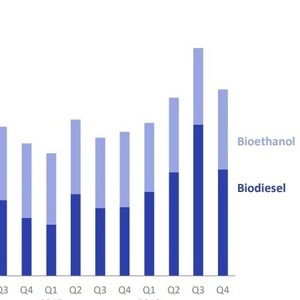UK biodiesel consumption hits new record in 2018

Source: U.K. Department for Business, Energy and Industrial Strategy
April 2, 2019
BY Erin Krueger
The U.K. Department for Business, Energy and Industrial Strategy has released new energy data for 2018, reporting that ethanol consumption increased last year, while biodiesel consumption hit a new record high.
According to the BEIS, 1.925 billion liters (508.5 million gallons) of liquid biofuels were consumed by the U.K. transportation sector last year, up 33 percent when compared to 2017.
Ethanol consumption increased 2.6 percent, from 753 million liters in 2017 to 773 million liters in 2018. Biodiesel consumption increased by 65 percent, from 697 million liters in 2017 to 1.152 billion liters in 2018—a new record high.
Advertisement
Advertisement
In terms of volume, the BEIS reported that ethanol accounted for 40 percent of U.K. biofuel consumption last year, while biodiesel accounted for 60 percent. Ethanol comprised 4.6 percent of gasoline last year, while biodiesel accounted for 3.8 percent of total diesel. The combined contribution for total road fuels was 4.1 percent, up from 3.1 percent in 2017.
Advertisement
Advertisement
Related Stories
Global digital shipbuilder Incat Crowther announced on June 11 the company has been commissioned by Los Angeles operator Catalina Express to design a new low-emission, renewable diesel-powered passenger ferry.
ATR and French SAF aggregator ATOBA Energy on June 19 signed a memorandum of understanding (MOU) to explore ways to facilitate and accelerate sustainable aviation fuel (SAF) adoption for ATR operators.
Argent Fuels, a leading provider of carbon-saving fuels in the UK, is accelerating its efforts to support a greener future. The expansion of its High Blend Biodiesel will supply to bus, coach, HGV fleets and rail in the south of the UK.
Sprague Operating Resources LLC on June 24 announced it has been selected by the New York City Department of Citywide Administrative Services to supply renewable diesel for its marine fleet, including the iconic Staten Island Ferry.
On June 17, the NYC Department of Citywide Administrative Services and the Department of Transportation announced the start of the Staten Island Ferry’s transition to renewable diesel, marked by the delivery of the first barge of fuel.
Upcoming Events










